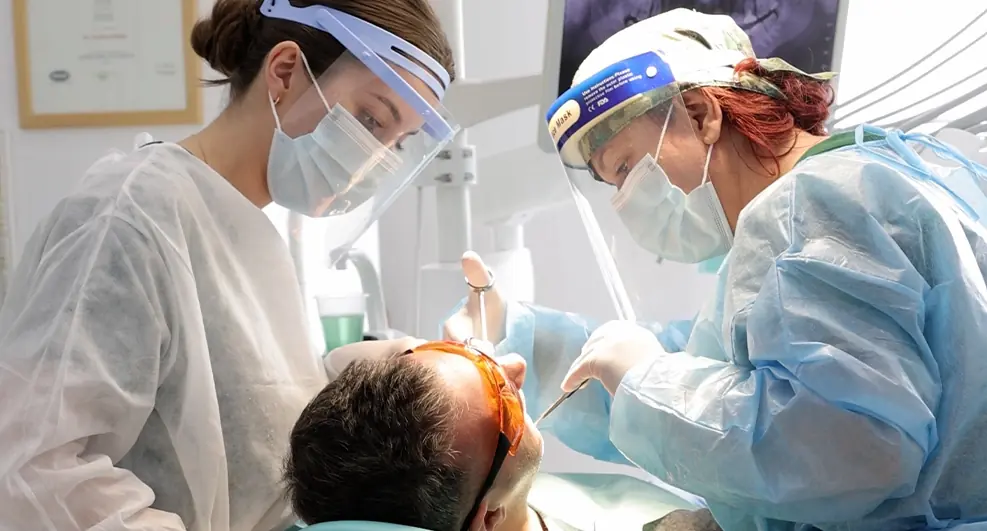A dental crown is a protective cap placed over a damaged, decayed, or weakened tooth. This restorative treatment not only restores the tooth’s shape, size, and strength but also improves its appearance. Dental crowns are commonly used when a tooth is severely worn down, cracked, or after a root canal treatment. They are custom-made to fit over the entire visible part of the tooth, right above the gum line, and are an essential option for preserving your natural teeth.
The Dental Crown Procedure

The dental crown procedure typically involves two visits to the dentist. During the first appointment, the dentist prepares the tooth by removing any decay and shaping it to fit the crown. An impression of the tooth is then taken to create a custom crown that matches the color and contour of your natural teeth. A temporary crown is placed over the tooth to protect it until the permanent crown is ready.
Once the permanent crown is fabricated, which usually takes about two to three weeks, you’ll return for the second visit. During this appointment, the dentist removes the temporary crown and cements the permanent one in place. This procedure is generally painless, thanks to local anesthesia, and the results are both functional and aesthetic.
How Much is a Dental Crown?
When considering dental crowns, the cost can be a significant factor in deciding where to undergo the procedure. Albania has become an increasingly popular destination for dental tourism, offering high-quality dental care at a fraction of the cost compared to countries like the USA.

In the United States, the average cost of a dental crown ranges from $800 to $1,500 per tooth, depending on the material used and the complexity of the procedure. For porcelain or ceramic crowns, which are preferred for their natural appearance, the price can even exceed $2,000 per tooth. These prices often do not include additional costs, such as consultation fees, x-rays, and follow-up appointments, which can add significantly to the total cost.
| Aspect | USA | Italy | Albania |
|---|---|---|---|
| Average Price per Crown | $800 – $1,500+ | €500 – €1,200 | €200 – €500 |
| Porcelain/Ceramic Crown Cost | $1,200 – $2,000+ | €800 – €1,500 | €300 – €500 |
| Consultation Fees | $100 – $250 | €50 – €150 | Included in treatment cost |
| Additional Costs | X-rays, follow-ups (extra) | X-rays, follow-ups (extra) | All-inclusive pricing |
| Quality of Materials | High (same in all countries) | High (same in all countries) | High (same in all countries) |
| Dental Technology | Advanced, cutting-edge | Advanced, up-to-date | Advanced, modern equipment |
| Dentist Training | Highly qualified, often international | Highly qualified, European standards | Highly qualified, often international |
| Overall Treatment Quality | Excellent, strict regulations | Excellent, European standards | Excellent, international standards |
| Savings Compared to USA | N/A | 20% – 40% | 50% – 70% |
In contrast, Albania offers dental crowns at a much more affordable rate, without compromising on quality. The average cost of a dental crown in Albania is typically between €200 and €500 per tooth. This price includes the entire procedure, from consultation to the final placement of the crown. The lower cost is due to Albania’s lower living expenses and operational costs for clinics, allowing them to provide top-tier dental services at a more accessible price.
Does Albania offer the same Quality
Although cheaper, Albanian dental facilities use cutting-edge technology and materials to provide high-quality care. Many Albanian dentists have studied abroad and use international best practices to provide good service.
Albanian dental crowns can save up to 70% compared to US ones, making them an interesting option for people seeking high-quality dental care at an inexpensive price. Albania is becoming a popular dental tourism destination, so you can expect a smooth experience from arrival to treatment.
Dental Crowns Before and After
Dental crowns can have a transformative effect on your smile. Before getting a crown, you may have a tooth that is chipped, cracked, or discolored. After the crown is placed, the tooth is restored to its full function and appearance. Crowns blend seamlessly with your natural teeth, making them an ideal solution for improving both the health and look of your teeth.
Patients who undergo the dental crown procedure often report an increase in confidence, as their teeth look more uniform and aesthetically pleasing. Whether it’s a front tooth or a molar, dental crowns can significantly enhance the overall harmony of your smile.
Types of Dental Crowns and Cost
There are several types of dental crowns available, each with its own set of advantages and costs:
- Porcelain Crowns: These are popular for their natural appearance and are often used for front teeth. They are more expensive but offer the best aesthetic results.
- Ceramic Crowns: Similar to porcelain, ceramic crowns are durable and blend well with natural teeth. They are slightly less expensive than porcelain crowns.
- Metal Crowns: Made from gold or other alloys, metal crowns are incredibly durable and are often used for molars where the aesthetic concern is minimal. They tend to be less expensive.
- Porcelain-Fused-to-Metal (PFM) Crowns: These crowns combine the strength of metal with the natural appearance of porcelain. They are a versatile option but can show a dark line near the gums over time.
- Zirconia Crowns: Known for their strength and natural appearance, zirconia crowns are a newer option that is gaining popularity. They are typically more expensive but offer the best of both worlds—durability and aesthetics.
Frequently Asked Questions:
Can You Put a Dental Bridge After a Crown?
Yes, you can put a dental bridge after a crown, and in many cases, this is a common practice in restorative dentistry. A dental bridge is used to fill the gap left by one or more missing teeth, and it relies on the adjacent teeth, or crowns, for support.
When a crown is already in place, it can serve as an anchor or abutment for the dental bridge. This means that the crown, which covers and strengthens the tooth, provides a stable foundation for the bridge. The bridge itself is composed of one or more artificial teeth, known as pontics, that are attached to the crowns on either side of the gap.
Can I have a Dental Crown for my front tooth?
When it comes to a front tooth, aesthetics are particularly important. Porcelain and ceramic crowns are typically recommended for front teeth because they can be color-matched to blend seamlessly with your natural teeth. These materials are also strong enough to withstand the daily wear and tear of biting and chewing, making them an ideal choice for maintaining both function and appearance.
In some cases, a crown for a front tooth may also require a bit more precision in its placement to ensure that it aligns perfectly with the rest of your teeth. Your dentist will take extra care to shape and polish the crown so that it fits comfortably and looks natural.
How Long Do Dental Crowns Last?
Dental crowns are a durable and long-lasting solution for restoring damaged or weakened teeth. On average, dental crowns can last between 10 to 15 years, but with proper care, they can sometimes last even longer—up to 20 years or more.
To Sum Up
Dental crowns are an effective solution for restoring the health, function, and appearance of damaged teeth. Whether you’re dealing with a cracked molar or a discolored front tooth, a dental crown can provide the protection and aesthetic improvement you need. With various types of crowns available, you can choose the option that best suits your needs and budget. By working with an experienced dentist, you can ensure that your crown not only looks great but also lasts for many years to come.
EXCELLENTBased on 119 reviews Posted on
Posted on
 Angelique Van Luchene2025-09-30Wij bezochten Dental clinic (Class Dent) per toeval. We werden opgehaald aan de luchthaven. We werden hartelijk omhaalt door Kevin. Super gast! We werden door Kevin meteen geïntroduceerd in de wereld van Albanië en wat er om leeft. Dit stelde ons meteen gerust.We werden eerst geconfronteerd met ons verblijf. Het appartement waar we verbleven was heel proper. Kort erna werden we verwacht in de kliniek, heel proper, de laatste nieuwe apparatuur en hier hartelijk onthaald geweest. We hebben hier ook de eerste richtlijn gehad wat er ons te wachten stond. De dag erna werden alle tanden getrokken die moesten verwijderd worden. Een hele goeie opvolging van Kevin die mij constant op de hoogte houd van wat er was gebeurd met mijn man. Elke dag stonden er een of meerdere consultaties op de agenda voor de opvolging. De hygiëne is er op en top ! Drie dagen na de operatie werden de voorlopig tanden geplaatst, zoals beloofd. Wij zijn de dag erna teruggevlogen naar België en we wachten nog 3-4 maanden af om terug te komen zodat de uiteindelijke implantaten kunnen geplaatst worden. Wij zijn alvast heel enthousiast over het gebeuren en de werking van de kliniek .Wij zien elkaar terug en februari of maart 2026 voor de definitieve tanden. Kevin, en de rest van de tandartsen…jullie zijn toppers ! Jullie toveren een lach op iemands gezicht die al heel lang niet meer kon lachen. Vele groeten Diederik en AngeliquePosted on
Angelique Van Luchene2025-09-30Wij bezochten Dental clinic (Class Dent) per toeval. We werden opgehaald aan de luchthaven. We werden hartelijk omhaalt door Kevin. Super gast! We werden door Kevin meteen geïntroduceerd in de wereld van Albanië en wat er om leeft. Dit stelde ons meteen gerust.We werden eerst geconfronteerd met ons verblijf. Het appartement waar we verbleven was heel proper. Kort erna werden we verwacht in de kliniek, heel proper, de laatste nieuwe apparatuur en hier hartelijk onthaald geweest. We hebben hier ook de eerste richtlijn gehad wat er ons te wachten stond. De dag erna werden alle tanden getrokken die moesten verwijderd worden. Een hele goeie opvolging van Kevin die mij constant op de hoogte houd van wat er was gebeurd met mijn man. Elke dag stonden er een of meerdere consultaties op de agenda voor de opvolging. De hygiëne is er op en top ! Drie dagen na de operatie werden de voorlopig tanden geplaatst, zoals beloofd. Wij zijn de dag erna teruggevlogen naar België en we wachten nog 3-4 maanden af om terug te komen zodat de uiteindelijke implantaten kunnen geplaatst worden. Wij zijn alvast heel enthousiast over het gebeuren en de werking van de kliniek .Wij zien elkaar terug en februari of maart 2026 voor de definitieve tanden. Kevin, en de rest van de tandartsen…jullie zijn toppers ! Jullie toveren een lach op iemands gezicht die al heel lang niet meer kon lachen. Vele groeten Diederik en AngeliquePosted on
 Nicola Buono2025-09-20Sono degli angeli professionali, gentili e abbastanza onestiPosted on
Nicola Buono2025-09-20Sono degli angeli professionali, gentili e abbastanza onestiPosted on
 Malgorzata Skala2025-08-29During my holiday, I ended up at this clinic completely by chance – I broke a tooth and needed urgent help. I was pleasantly surprised by how quickly and professionally I was treated. From the very beginning, the staff were extremely kind, friendly, and caring, and the doctor explained every step of the treatment in detail. Despite the stressful situation, I felt very well taken care of. The procedure was carried out efficiently and painlessly, and the result exceeded my expectations. The atmosphere in the clinic is welcoming and modern, and it is clear that the people working there are passionate and highly experienced. I am grateful that I came across this place – they saved my holiday and restored the comfort of my smile. I can wholeheartedly recommend it to anyone looking for professionalism combined with a truly human approach.Posted on
Malgorzata Skala2025-08-29During my holiday, I ended up at this clinic completely by chance – I broke a tooth and needed urgent help. I was pleasantly surprised by how quickly and professionally I was treated. From the very beginning, the staff were extremely kind, friendly, and caring, and the doctor explained every step of the treatment in detail. Despite the stressful situation, I felt very well taken care of. The procedure was carried out efficiently and painlessly, and the result exceeded my expectations. The atmosphere in the clinic is welcoming and modern, and it is clear that the people working there are passionate and highly experienced. I am grateful that I came across this place – they saved my holiday and restored the comfort of my smile. I can wholeheartedly recommend it to anyone looking for professionalism combined with a truly human approach.Posted on
 Ardjana Himalli2025-08-25Mi sono trovata davvero molto bene presso questo studio dentistico. Ho apprezzato fin da subito la grande professionalità di tutto lo staff, unita a una gentilezza che mette subito a proprio agio. L’ambiente è accogliente, curato e soprattutto estremamente pulito, cosa che trasmette un senso di sicurezza e attenzione ai dettagli. Durante le visite mi sono sempre sentita ascoltata e seguita con competenza. Consiglio vivamente a chi cerca un dentista serio, preparato e umano.Posted on
Ardjana Himalli2025-08-25Mi sono trovata davvero molto bene presso questo studio dentistico. Ho apprezzato fin da subito la grande professionalità di tutto lo staff, unita a una gentilezza che mette subito a proprio agio. L’ambiente è accogliente, curato e soprattutto estremamente pulito, cosa che trasmette un senso di sicurezza e attenzione ai dettagli. Durante le visite mi sono sempre sentita ascoltata e seguita con competenza. Consiglio vivamente a chi cerca un dentista serio, preparato e umano.Posted on
 kyle orten2025-08-09Excellent care and customer service.Posted on
kyle orten2025-08-09Excellent care and customer service.Posted on
 Ferdows Rasooli2025-07-25I did implant in hier with my wife and the surgery was gone very good, Was the best experience at this clinic, respectful stuff and respectful Doctor, thank youPosted on
Ferdows Rasooli2025-07-25I did implant in hier with my wife and the surgery was gone very good, Was the best experience at this clinic, respectful stuff and respectful Doctor, thank youPosted on
 Oliver Memo2025-07-17La migliore esperienza dentale che io abbia mai avuto. Sono stati molto gentili, specialmente il dottor Marius, il mio dentista preferito.Posted on
Oliver Memo2025-07-17La migliore esperienza dentale che io abbia mai avuto. Sono stati molto gentili, specialmente il dottor Marius, il mio dentista preferito.Posted on
 David Jonsson2025-07-09Exceptional Dental Experience in Durrës, Albania From the very beginning, the service at ClassDent Clinic (Lagja 1, Rruga Taluantia, 2001, Durrës, Albania) was world-class. The clinic’s team handled everything with professionalism, care, and great efficiency, making the entire experience smooth and stress-free. What truly stood out were four key things: 1. Outstanding service from the first contact to the final appointment. 2. Excellent communication—clear, responsive, and reassuring throughout. 3. A highly skilled and kind dental team, who made me feel comfortable and well taken care of. 4. Very reasonable prices, especially considering the top-tier quality of care provided. If you’re considering dental work abroad, I can wholeheartedly recommend ClassDent Clinic in Durrës. Their commitment to patient care, modern equipment, and professional approach truly set them apart. A first-class experience from start to finish.Posted on
David Jonsson2025-07-09Exceptional Dental Experience in Durrës, Albania From the very beginning, the service at ClassDent Clinic (Lagja 1, Rruga Taluantia, 2001, Durrës, Albania) was world-class. The clinic’s team handled everything with professionalism, care, and great efficiency, making the entire experience smooth and stress-free. What truly stood out were four key things: 1. Outstanding service from the first contact to the final appointment. 2. Excellent communication—clear, responsive, and reassuring throughout. 3. A highly skilled and kind dental team, who made me feel comfortable and well taken care of. 4. Very reasonable prices, especially considering the top-tier quality of care provided. If you’re considering dental work abroad, I can wholeheartedly recommend ClassDent Clinic in Durrës. Their commitment to patient care, modern equipment, and professional approach truly set them apart. A first-class experience from start to finish.Posted on
 j——- D-man2025-07-02In februari en juni geweest en niets anders dan lof voor hun kunde en professionele aanpak. Je gaat pas naar huis als alles perfect is. Nog maals dank voor mijn perfecte glimlach en 5 sterren is veel te weinig. Dus voor jullie ⭐️⭐️⭐️⭐️⭐️⭐️⭐️⭐️⭐️⭐️
j——- D-man2025-07-02In februari en juni geweest en niets anders dan lof voor hun kunde en professionele aanpak. Je gaat pas naar huis als alles perfect is. Nog maals dank voor mijn perfecte glimlach en 5 sterren is veel te weinig. Dus voor jullie ⭐️⭐️⭐️⭐️⭐️⭐️⭐️⭐️⭐️⭐️







